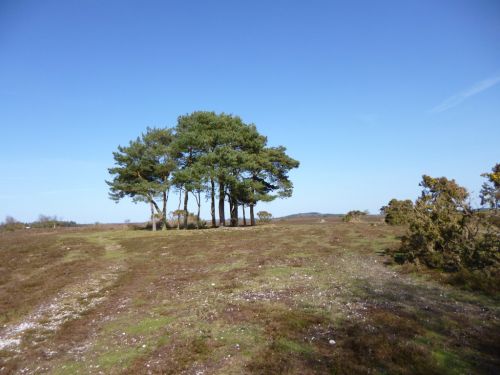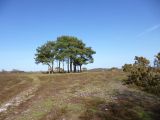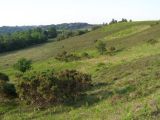Robin Hood's Butt (Furze Hill): Difference between revisions
mNo edit summary |
mNo edit summary |
||
| Line 4: | Line 4: | ||
[[File:{{#var:Image}}|thumb|right|500px|Robin Hood's Butt or Clump / [https://m.geograph.org.uk/photo/2877971 Mike Faherty, 1 Apr. 2012; Creative Commons, via Geograph.]]] | [[File:{{#var:Image}}|thumb|right|500px|Robin Hood's Butt or Clump / [https://m.geograph.org.uk/photo/2877971 Mike Faherty, 1 Apr. 2012; Creative Commons, via Geograph.]]] | ||
<div class="no-img"><p id="byline">By Henrik Thiil Nielsen, 2022-05-05. Revised by {{#realname:{{REVISIONUSER}}}}, {{REVISIONYEAR}}-{{REVISIONMONTH}}-{{REVISIONDAY2}}.</p> | <div class="no-img"><p id="byline">By Henrik Thiil Nielsen, 2022-05-05. Revised by {{#realname:{{REVISIONUSER}}}}, {{REVISIONYEAR}}-{{REVISIONMONTH}}-{{REVISIONDAY2}}.</p> | ||
Text to follow. | |||
<!-- Mike Faherty photo: Ibsley Common, clump of trees. On the ridge overlooking Chibden and Brogenslade Bottoms; distinctive enough to be a landmark. --> | <!-- Mike Faherty photo: Ibsley Common, clump of trees. On the ridge overlooking Chibden and Brogenslade Bottoms; distinctive enough to be a landmark. --> | ||
Revision as of 19:19, 5 May 2022
| Locality | |
|---|---|
| Coordinate | 50.894946, -1.757353 |
| Adm. div. | Hampshire |
| Vicinity | Ibsley Common, New Forest; near Furze Hill; c. 1 km SE of North Gorley; c. 1 km NE of South Gorley |
| Type | Natural feature |
| Interest | Robin Hood name |
| Status | Extant |
| First Record | 1872 |

By Henrik Thiil Nielsen, 2022-05-05. Revised by Henrik Thiil Nielsen, 2022-05-05.
Text to follow.
Allusions
1910 - Sumner, Heywood - Book of Gorley
The three clumps of Scots fir & Weymouth pine – Whitefield[,] Robin Hood's, & Dorridge – were planted by the 2nd Lord Normanton to give landmarks & variety to his view of the long line of the New Forest Hills from Somerley – so the story is told – Whitefield & Dorridge were planted about 1835 – Robin Hood's about 1850 – Dorridge is the highest ground on the common – 257 feet above the sea level – while the lowest part is at the caltle [sic, for 'cattle'] stop, where the Huckles brook leaves the common – 100 feet above the sea level.[1]
Gazetteers
- Not included in Dobson, R. B., ed.; Taylor, J., ed. Rymes of Robyn Hood: an Introduction to the English Outlaw (London, 1976), pp. 293-311.
Sources
- Heritage Gateway: National Trust HBSMR 123290: Robin Hood's Clump, Ibsley Common, Ibsley and Rockford Commons
- National Trust: Heritage Records: Robin Hood's Clump, Ibsley Common, Ibsley and Rockford Commons.
Maps
- 25" map Hampshire and Isle of Wight LXII.12 (c. 1875; surveyed 1870). No copy in NLS
- 25" O.S. map Hampshire and Isle of Wight LXII.12 (1897; rev. 1895) (georeferenced)
- 25" O.S. map Hampshire and Isle of Wight LXII.12 (1897; rev. 1895)
- 25" O.S. map Hampshire and Isle of Wight LXII.12 (1909; rev. 1907)
- 25" O.S. map Hampshire and Isle of Wight LXII.12 (1946; rev. 1940)
- 6" O.S. map Hampshire & Isle of Wight LXII (1872; surveyed 1870–71)
- 6" O.S. map Hampshire & Isle of Wight LXII.SE (1898; rev. 1895) (georeferenced)
- 6" O.S. map Hampshire & Isle of Wight LXII.SE (1898; rev. 1895)
- 6" O.S. map Hampshire & Isle of Wight LXII.SE (1910; rev. 1907).
Also see
Notes
Image gallery
Click any image to display it in the lightbox, where you can navigate between images by clicking in the right or left side of the current image.
Robin Hood's Butt or Clump / Mike Faherty, 1 Apr. 2012; Creative Commons, via Geograph.
Approaching Robin Hood's Clump, Ibsley Common, New Forest / Jim Champion, 10 June 2006; Creative Commons, via Geograph.
The view from Robin Hood's Butt, New Forest / Jim Champion, 10 June 2006; Creative Commons, via Geograph.



